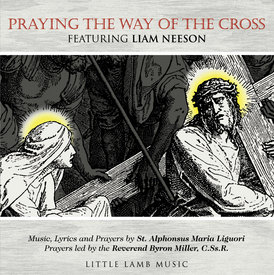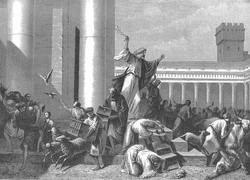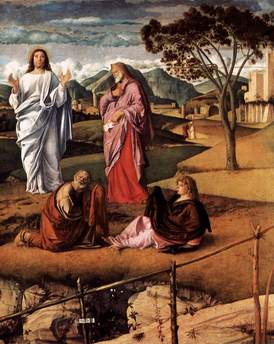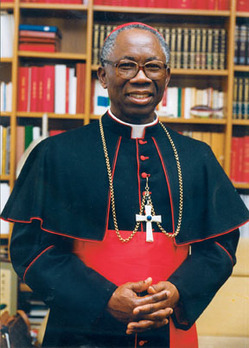Part III of Mike Aquilina's "An Introduction to Lent"
Of the three marks of Lent -- prayer, fasting and almsgiving -- almsgiving is surely the most neglected.
And yet, in the only place where the Bible brings all three together, the inspired author puts the emphasis firmly on the last: "Prayer and fasting are good, but better than either is almsgiving accompanied by righteousness ... It is better to give alms than to store up gold; for almsgiving saves one from death and expiates every sin. Those who regularly give alms shall enjoy a full life" (Tobit 12:8-9).
Why is almsgiving better than prayer and fasting? Because it is prayer, and it involves fasting. Almsgiving is a form of prayer because it is "giving to God" -- and not mere philanthropy. It is a form of fasting because it demands sacrificial giving -- not just giving something, but giving up something, giving till it hurts.
Jesus presented almsgiving as a necessary part of Christian life: "when you give alms, sound no trumpet before you, as the hypocrites do in the synagogues and in the streets, that they may be praised by men. Truly, I say to you, they have received their reward. But when you give alms, do not let your left hand know what your right hand is doing" (Matthew 6:2-3). He does not say IF you give alms, but WHEN. Like fasting and prayer, almsgiving is non-negotiable.
The first Christians knew this. "There was no needy person among them, for those who owned property or houses would sell them, bring the proceeds of the sale, and put them at the feet of the apostles, and they were distributed to each according to need" (Acts 4:34-35).
That was the living embodiment of a basic principle of Catholic social teaching, what tradition calls "the universal destination of goods." The Catechism of the Catholic Church puts it succinctly: "The goods of creation are destined for the entire human race" (n. 2452).
But they can't get there unless we put them there -- and that requires effort.
As with prayer and fasting, so with almsgiving. If we have a plan, we'll find it easier to do. Throughout history, many Christians have used the Old Testament practice of "tithing" as a guide -- that is, they give a tenth of their income "to God." In practice, that means giving it to the poor, to the parish, or to charitable institutions.
My friend Ed Kenna, an octogenarian and dad, remembers the day he decided to start tithing. "When I was a senior in high school, back in 1939-40, I read an article on charitable giving in a Catholic newspaper," he recalls. "And it had a lot of testimonies to the fruits of tithing. Breadwinners told how God provided whenever they were in need or had an emergency. I decided, then and there, to start tithing, and I've been doing it ever since."
For Kenna, those 65 years have had their financial ups and downs. He served in the military during World War II, went to college and raised a family of nine children. Through it all, he says, he was often tempted, but he never wavered in his tithing. "There were many times when I reached a point where I said, 'Something has to give -- but I'm not going to give up on my tithing.'"
It's a matter of trusting God, Kenna adds, "and God will not be outdone in generosity."
Jesus said, "It is more blessed to give than to receive" (Acts 20:35), but those who tithe often find themselves on the receiving end as well. "I worked as an industrial engineer through the highs and lows of American industry," Kenna recalls. "Twice my job fell victim to corporate mergers, but the phone always rang just in time. I never lost an hour of work to layoffs."
He sees the difficult times as God's test of our trust. "It's especially hard in the beginning. On your first paycheck, it hurts. On the second, the pain's a little less. At about the third or fourth, there's no pain at all. You get used to it. It's a habit. But you have to make that firm resolution: I'm gonna do it and not give in."
Kenna, like many others, interprets tithing to mean taking ten percent off the "first fruits" -- gross income, rather than net. He divides this up as "5 percent to the parish and 5 percent to other Catholic institutions." He also gives of his time and has, for many decades, been a volunteer for the St. Vincent de Paul Society.
Indeed, many Catholics extend the concept of almsgiving beyond money to include time and talent as well, donating a portion of these to worthy causes.
In the late fourth century, St. John Chrysostom looked at the good life people were living in the imperial court, and he was filled with righteous anger. In the name of God, he raged against those who owned toilet seats made of gold, while other people starved in cold hovels.
While our commodes may be made of less precious materials, many Americans today enjoy a better standard of life than any Byzantine emperor ever knew. Central heat, central air conditioning, electric lights, consistently safe food and water, antibiotics, and even aspirin -- these are luxuries beyond the dreams of our ancient ancestors.
We are living high, but are we giving high?
It's a good question to ask ourselves during Lent. It is a scandal, after all, for Christians to have closets overstuffed with clothing when there are families who are shivering because they can't pay their heating bill. It is a scandal for Christians to be epidemically overweight when they have near neighbors who go to bed hungry.
We need to give to God -- whom we meet in our neighbor -- until these problems go away. Whatever we give, whether it's a tenth or a twentieth or half, is symbolic of the greater giving that defines the Christian life. As God gave himself entirely to us, so we give ourselves entirely to Him. In the Eucharist, He holds nothing back. He gives us His body, blood, soul and divinity -- everything He has. That's the giving we need to imitate.
Charity begins at home, where we daily make the choice to give our time, our attention, our affirming smile, and give generously. But charity must not stop there, because for Catholics "home" is universal, and our family is as big as the world. We need to dig deep and give much where much is needed. But, whenever possible, our charity should also involve personal acts, not just automatic withdrawals from our bank account. Pope John Paul asked us to see, and be seen by, "the human face of poverty."
We give what we have till we have nothing left to give. My friend and sometime co-author Regis Flaherty remembers his sister Pat as a woman who practiced giving all her life, to her sibilings, her husband, her children and her friends. To the end, she gave what she could. "When she was dying she was in and out of consciousness, but whenever she looked up at us, she would invariable smile -- absolutely amazing considering how much she was suffering."
Sometimes all we can give is a smile, but sometimes that is the greatest sacrifice, the greatest prayer, and indeed the most generous and most sacrificial alms.
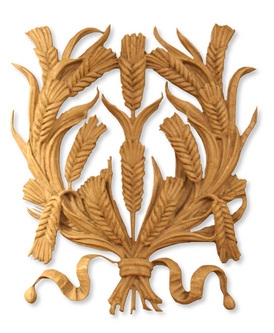 The human race may be compared to spikes of wheat in a field, rising, as it were, from the earth, awaiting their full growth and development, and then in time being cut down by the reaper, which is death. The comparison is apt, since Christ Himself spoke of our race in this way when He said to His holy disciples: "Do you not say, 'Four months and it will be harvest time?' Look at the fields I tell you, they are already white and ready for harvesting. The reaper is already receiving his wages and bringing in a crop for eternal life."
The human race may be compared to spikes of wheat in a field, rising, as it were, from the earth, awaiting their full growth and development, and then in time being cut down by the reaper, which is death. The comparison is apt, since Christ Himself spoke of our race in this way when He said to His holy disciples: "Do you not say, 'Four months and it will be harvest time?' Look at the fields I tell you, they are already white and ready for harvesting. The reaper is already receiving his wages and bringing in a crop for eternal life."



